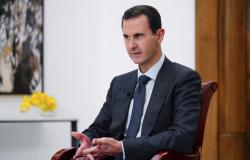The Syrian pound has regained value against the dollar, more than a week after the fall of Syrian President Bashar al-Assad, money changers and traders testified Monday, noting the return of foreign currencies to local markets.
The day before the fall of Damascus into the hands of a coalition of rebel groups dominated by the Islamists of Hayat Tahrir al-Sham, on December 7, the exchange rate on the black market exploded, reaching 30,000 pounds to the dollar, i.e. double what it had been in recent months.
On Monday, the Syrian currency was trading at 10,000 or 12,000 pounds, a money changer, a jeweler and a receptionist at a hotel told AFP.
A Lebanese taxi driver even exchanged money at the rate of 9,000 Syrian pounds to the dollar before crossing the border.
The rate on the black market thus equaled the official rate for the first time in years, in the absence of exchange offices.
“In every country in the world, the local currency collapses with the fall of a regime. Here in Syria it seems to be the opposite,” said Raghid Mansour, owner of a jewelry store in a Damascus souk. .
“It is not yet a fixed price, but the pound is gradually gaining value,” added the 74-year-old trader.
For Qoussai Ibrahim, a professor at the Faculty of Economics at the University of Damascus, the improvement in the rate of the pound is linked to both “political and economic” factors.
“On the one hand, we have an influx of dollars” from areas that were held by the rebels, “and also thanks to all the foreign journalists and employees of international organizations” who go to Syria, he explains. .
In front of the renowned ice cream parlor, Bekdach, in Damascus, where dozens of people were queuing, prices were displayed in Syrian and Turkish pounds and dollars.
The former government formally prohibited all transactions that were made in foreign currencies, with penalties of up to seven years in prison.
So much so that Syrians avoided using the word “dollar” in public and using it in telephone messages, for fear of being arrested.
The Syrian pound has lost around 90% of its value since the start of the conflict in 2011.
With AFP






